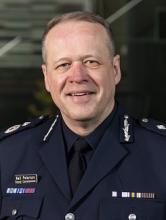- Date:
- 27 Feb 2023
Message from Deputy Commissioner Neil Paterson
I am pleased to introduce this Victoria Police Access and Inclusion Action Plan 2023–2024.
It is important that we all promote inclusion and participation for all Victoria Police employees and that we respect and value every individual.
This action plan builds on the Accessibility and Inclusion Strategy and Action Plan 2018–2021 (2018–2021 action plan) and reaffirms our commitment to creating a workplace that is welcoming and accessible for employees with a disability.
As the Executive Sponsor for the Victoria Police Enablers Network (VP Enablers), I hear first-hand from our employees with disability about their experiences in our workplaces. I know from my work with VP Enablers that we have achieved some good progress together. I also know that Victoria Police still has much to learn about how to fully embrace the opportunity to have people with disability working in our organisation.
As a result of our commitments made in the 2018–2021 action plan, we have broken down some barriers by introducing a Workplace Adjustment Passport and we led the establishment of a whole of Victorian Government mentoring program for employees with a disability.
To further reduce barriers to employment and progression of people with disability, we must look closely at our understanding of what makes a good police officer, a good protective services officer, and a good Victorian Public Service employee of Victoria Police. Some employees come to work for Victoria Police while having a disability, others first encounter their disability during their employment with us.
This action plan aims to expand our understanding of the needs of people with disability in our workforce and to create positive changes for all employees and the community we serve.
I welcome the inclusion in the 2023–2030 Workforce Diversity and Inclusion Framework of a monitoring, evaluation and learning (MEL) tool to add rigour to our progress towards implementing this action plan.
I would like to thank our past and present employees with a disability and allies, particularly those members of VP Enablers who have been vocal and enthusiastic advocates for trailblazing change for the benefit of people with disability and for Victoria Police.
Neil Paterson APM
Deputy Commissioner, Victoria Police
Executive Champion
About the Victoria Police Access and Inclusion Action Plan 2023-2024
The Victoria Police Access and Inclusion Action Plan 2023–2024 is part of the Victoria Police Workforce Diversity and Inclusion Framework 2023–2030 (Framework).
Acknowledgement statement
Access and Inclusion Action Plan: Introduction
Learn about the Victoria Police Access and Inclusion Action Plan 2023-2024.
Access and Inclusion Action Plan: What are we talking about?
How we define disability, and where we are at for access and inclusion.
Access and Inclusion Action Plan: How far we've come
The progress we’ve made towards providing an accessible and inclusive organisation for employees with a disability.
Access and Inclusion Action Plan: Where can we improve?
Where we need to improve and focus effort to continue building an inclusive environment for employees with a disability.
Access and Inclusion Action Plan: Where we want to be and how we are getting there
How Victoria Police will work towards an inclusive workplace for employees with a disability.
Access and Inclusion Action Plan: The next step
The actions and milestones that aim to create inclusion for employees with a disability.
Access and Inclusion Action Plan: Acronyms and shortened forms
The meanings behind the acronyms and shortened forms in the Access and Inclusion Action Plan.
Access and Inclusion Action Plan: Glossary
The glossary of terms used in the Access and Inclusion Action Plan.
Access and Inclusion Action Plan: Appendix 1 - Diversity and Inclusion Program Logic
The program logic of activities, outputs and outcomes needed to achieve a diverse workforce and inclusive organisation.
Updated

